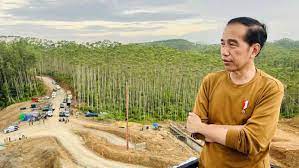
Indonesian President Joko "Jokowi" Widodo has taken further steps this year to limit the export of highly sought commodities in an effort to promote a resource nationalism that favors developing value-added downstream industries, but brings friction over free trade.
During an investment forum in early February, Widodo hinted at an export ban for tin, gold and other metals. During a January meeting of the ruling Indonesian Democratic Party of Struggle, he said Indonesia will ban exports of copper "maybe in the middle of year."
This all came on the heels of Widodo's December announcement that the government will prohibit the export of bauxite starting in June.
Each of the commodities targeted by Widodo is expected to see rising demand amid the global shift from carbon, as countries worldwide have established goals for cutting greenhouse gases to combat climate change. Widodo himself pledged to attain net-zero emissions by the year 2060.
Bauxite is used in making aluminum, a lightweight material that is easily recyclable and is gaining attention as an energy-saving material. Indonesia is the sixth-largest producer of bauxite, according to the U.S. Geological Survey.
Under a bauxite export ban, the value of related exports will nearly triple to 62 trillion rupiah ($4 billion), Widodo has predicted.
The president has laid out a grand strategy to tighten exports of raw materials and "develop the downstream industries" related to those commodities. Copper, for example, is a critical resource for manufacturing electric vehicles and solar power equipment.
Prior to the announced bans on bauxite and copper exports, Indonesia started outlawing the exports of nickel ore in January 2020. Widodo had said the export value of processed-nickel products would jump to 468 trillion rupiah in 2022, more than 27 times the equivalent in 2014, which was primarily made up of nickel ore.
The price of the three-month contract for nickel futures on the London Metal Exchange, an international benchmark, is now nearly double the level seen in early 2020.
Nickel is critical for making batteries for electric vehicles, and Indonesia is the world's top producer of the metal by volume. By banning exports of nickel ore, Widodo expects to draw investment to Indonesia's processing industry instead of simply shipping out raw material.
Big-name battery makers such as South Korea's LG Energy Solution and China's CATL have decided to build new plants in Indonesia. Hyundai Motor and China-based SAIC-GM-Wuling Automobile each launched local production last year.
Now, Widodo is lobbying Tesla and automakers from Japan and Europe to begin onshore EV manufacturing in Indonesia, with the goal of attracting investment and transforming his country into a Southeast Asian manufacturing hub.
However, this trajectory has generated diplomatic tension. In 2019, the European Union formally requested that the World Trade Organization establish a dispute settlement panel regarding Indonesia's restrictions on nickel ore exports.
Last November, the WTO panel ruled in favor of the EU and issued a report outlining how Indonesia's export curbs are inconsistent with WTO provisions that bar member states from setting quantitative limits on exports and imports against fellow signatories.
Indonesia immediately filed an appeal, citing differences with the WTO ruling. Widodo further defended his economic policy decisions in a speech delivered during a summit between the EU and the Association of Southeast Asian Nations late last year.
"Indonesia wants to emphasize that an inclusive and value-added development will support global economic sustainability in a just manner," said Widodo. "Related to this, Indonesia will continue to establish downstream industry."
China is one of the largest consumers of Indonesia's bauxite. Beijing may air dissatisfaction with an export ban as economic growth at home is slowing. Widodo said in late February that he was not sure how China would respond.
Indonesia's business community has expressed concerns that the country does not have the capacity to process all the extra raw material, and that the export bans would result in suspended operations.
"It's possible that the government will allow some exports of bauxite under certain conditions in response to the lack of domestic processing capacity and pushback from industry," said Tomohiro Shiratori, deputy director at the Japan Organization for Metals and Energy Security. "However, the government has positioned the export bans as a success, and the trend toward resource protectionism will continue."
Source: Nikkei Asia
Share: